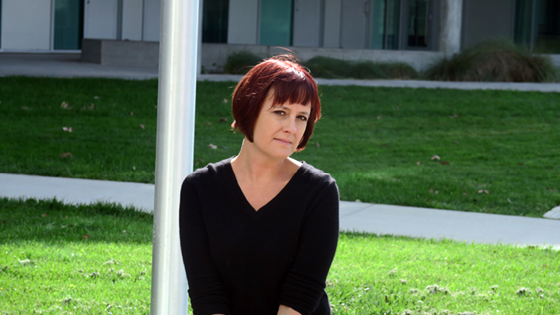
UCI professor wants to discuss your debt
English professor hopes classroom conversations on debt will dispel feelings of shame and lead to institutional reform
By Annabel Adams
Annie McClanahan is on a crusade to change the way we think and talk about debt. A new assistant professor of English at the University of California, Irvine, McClanahan believes our understanding of, and actions around, debt are so important she has made it a central part of her pedagogy and politics—often encouraging her students (and even strangers she meets on the bus) to share their debt stories.
Unlike generations before us, debt is a defining feature of our economic life, with 80% of Americans currently indebted with household, student loan, credit card, and other kinds of debt. Despite the commonality of debt, those who have it often view their circumstance as a moral failing rather than a political issue. McClanahan is working to change that. For the past seven years, she has studied the concepts and cultural implications of debt. Her first book, Dead Pledges: Debt, Crisis, and 21st Century Culture (Stanford University Press, 2016), takes debt as its focus and explores the ways that U.S. culture—from novels and poems to photojournalism and horror movies—has responded to the financial collapse of 2008.
McClanahan is no stranger to debt herself, having accrued $90,000 of student debt over the course of getting her B.A., M.A., and Ph.D. In 2009, amidst tuition increases in the UC system, McClanahan began to think about what it means to pay for an education with debt, and about how debt affects students’ relationships not only to their education, but also to the university as an institution. “Students didn’t always have to take out loans to afford college. As recent as the 1980s, students could pay for a year’s tuition at UC Berkeley by working a part-time, minimum-wage job over the summer,” said McClanahan. “Unfortunately, wages have stagnated while tuition has skyrocketed, and most students are facing tremendous loan debt.” The average American under 35 holds 182 percent more college loans than students graduating in 1995 did, according to Federal Reserve data.
In the classroom, McClanahan likes to start the debt conversation by “confessing” her own debt and then asking her students: why do we tend to dislike talking about our debt? Why do we tend to present it as something shameful?
“I have found these conversations uniquely powerful. My students have not only illuminated the present historical and political terrain with stark clarity for me; they've also given me a great deal of hope: I think they are the first generation to see debt as a form of economic exploitation rather than as a moral obligation or personal shame, and I think that is the starting point for any politics against indebtedness as a shared condition,” McClanahan said.
Ultimately, though, McClanahan is hoping the discussion leaves the walls of the university and sparks real institutional reform. “The privatization of loans, for-profit college education, lack of national increases in the minimum wage—these are issues of concern especially given our current political landscape. Working and middle-class students have the most to lose,” she said. “I hope that Dead Pledges is the beginning of a new conversation that starts from a place of understanding that debt is not tied to our moral character; people are in debt to pay for the necessities of life; and this is a situation that has to change.”
In winter 2017, McClanahan will teach a graduate seminar on “Critical Economies.” She is currently at work on a new project that discusses the development of microeconomics in a relatively much wider historical scope. Her book Dead Pledges is available now.
